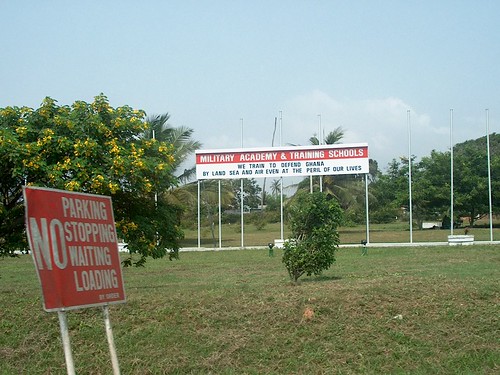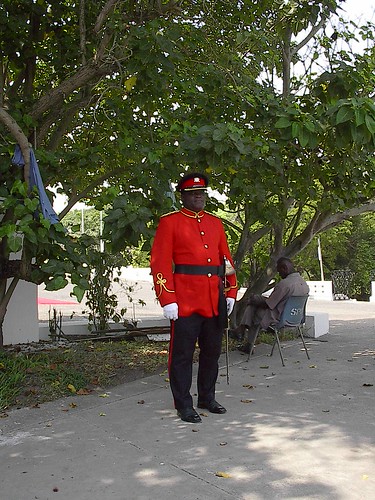The Codes of Martial Music
Earlier, the officers threatened to kill the PM if his supporters continued street protests in his defence...National radio interrupted its programmes to play military music, which correspondent say is code for a coup.
— Guinea-Bissau army head 'seized', April 1 2010
After a day of gunfire, explosions and nonstop military music on the radio in Niger’s capital, Niamey, the whereabouts of the president, Mamadou Tandja, remained unknown...
As of Thursday evening, the government had made no announcement about its status, even as martial music continued on the radio. A wrestling program replaced the evening news broadcast on state television. The streets were deserted and shops shut early.
— Palace in Niger Is Attacked by Soldiers, February 18, 2010
Bands of soldiers ransacked the homes of several ministers and gunshots rang out, residents reported. The junior officers were apparently tightening their grip on strategic buildings, with their supporters ensconced in the national broadcasting headquarters across the street from the American Embassy. There were no immediate reports of casualties.
The national radio station blared martial music. Many shops across the city were closed, though street vendors continued to sell mangoes, bananas and pineapples.
— Confusion After Guinea Coup Attempt, December 24, 2008
I have many memories of the two coups I lived through in Ghana in 1979 and 1981-82. Like many of my compatriots, I have chosen not to dwell on them and instead have noted simply that we are very discriminating in what we choose to remember and forget. The safe detail that lingers, however, is of the martial music that consumed the radio, and then the TV, airwaves in the ensuing days. We were treated to waves after waves of martial music on Ghana Broadcasting Corporation (GBC) that were only occasionally interrupted by the rantings of someone who claimed he was coming to protect us. Suffice to say that I have a visceral reaction to military strongmen and their rhetoric - I am blinded by the accompanying blood.
More interesting perhaps is that I have a deep appreciation of the codes and nuances of martial music. My first response to the news of any coup is to wonder whether this time-tested ritual, the playing of military music, had been followed. And then my curiosity and propensity for musical obsession takes the best of me: I ask around about the exact pieces of music that were played. When I do manage to get the nitty-gritty details, it is almost always disappointing: in the main, a few olde English paeans to blood-lust. The Francophone coups tended to run with more folksy arrangements and the North African had a rather elusive quality - the Arab influence perhaps. The martial music of our coups all had this alien, otherworldly aura - as if to remind the listener that the military in Africa were one of the most ruinous of our colonial inheritances.
I am left to wondering why in this day of of digital music and ipods, the savvy aspiring military junta couldn't come up with a more inspiring playlist. And in the context of Africa, didn't our warriors of old have fearsome praise songs written for their exploits? Couldn't some talking drums have the same effect? why not a "Made in Africa" soundtrack? But perhaps this is missing the point; martial music in the context of a coup is simply a code, a social signifier, and the disrupted programming an intimation of an enduring, if disastrous, tradition. The journalistic descriptions are always about 'blaring military music'. In contrast, in my memory, the dissonance is not really about volume but rather about unfamiliarity and annoyance: the horns were especially grating coming through the modest speakers of the portable radios we gathered around. The irritation was that you couldn't avoid this music even as your favourite news broadcast was preempted. The screeching horns resonated with the tinny sounds of your Grundig Waveboy and made for a rather somber nuisance.
Coups in the past century mostly seemed to follow the same blueprint and martial music was no mere footnote, I'd even wager that they were a critical ingredient. But have there been innovations one wonders, global guerrilla adaptations of the noisome strategy? Reading closely the above news reports, what is one to make about the detail of the 'wrestling program' that preempted regular programming after Niger's coup month's ago? Was it a case of l'appel de l'arènes. And was the continued selling of "mangoes, bananas and pineapples" in the streets after the Guinea coup a flourish of journalistic colour or merely a blasé signifier about the prospects of that grim lot.
I have friends who study the history of coups and military-civilian relations and who will wax poetic on when exactly it was that the airport became a necessary target for a nascent military junta. In Francophone Africa you always had to worry about a flight of French paratroopers swooping in to restore the current client dictator. Not so with coups in Anglophone or Portuguese Africa. Technology also changes things, these days a successful putsch in a healthy media market requires that you deal with those pesky communication networks and pay a threatening visit to mobile phone operators so that your opposition can't organize countering maneuvers.
During the struggle over the abolition of the monarchy in Nepal a few years ago, the reactionary forces tried to shut down the cell phone networks. They managed — for a day, and the enduring damage was done to their cause. The monarchy is no more. Aspiring military juntas should take note that one messes with the mobile phone networks at one's peril. The communication imperative is keenly felt. Even in the bloody aftermath of Iran's last election, the authorities didn't dare take the drastic step of shutting down the mobile networks. The day I read that headline, I'll know that they are done for.
Africa will be in the news a lot this year, and not simply for uplifting reasons like the World Cup in South Africa. It doesn't matter that many African countries will be celebrating 50 years of independence, brace yourself for some dismaying headlines even if natural disasters don't dominate. A major part of the narrative is going to be about coups and military/civilian relations. Throughout, it will be about how civil society fights against encroachments on the democratic gains made since the 1990s. Watch for slippages and authoritarian thuggishness on freedom of speech, watch for arbitrariness and vendettas resurfacing, watch for soi-disant democrats averting their eyes to due process. Consider Gbagbo dissolving the government in Cote d'Ivoire - and crucially the electoral commission. Take a look at Sudan in coming weeks for example. Muse on what Mugabe will come up with in Zimbabwe this year. Worry about why North Korea arms shipments are headed to Congo-Brazzaville. Observing the twists and turns in the African story can be very trying.
What are the necessary and sufficient conditions for a coup to succeed in 2010? What is needed in this modern age of citizen journalists, the internet, a web of global voices, cheap digital cameras, Twitter, Facebook, Ushahidi, ridiculously simple group forming and ubiquitous mobile phones and such? Is it enough to capture the radio and TV station as in the past? Should you even bother to threaten the newspapers? Surely the gadfly editors will be watching which way the wind is blowing with alternate headlines at the ready. Do you need to secure the army barracks or just the airport and the country's borders? What about a show of force? Send some tanks into the street? Should one surround the American, British, French and now Chinese embassy - the Chinese are big in Africa these days? In Guinea-Bissau today, soldiers were sent to surround the United Nations compound. Remember that some of the first targets of the Rwandan genocide were the Belgian UN blue helmeted peacekeepers. Or is the current fashion of targeting cabinet meetings the most expedient?
I suspect that the key feature in all this is playing martial music on the radio or TV. The dismal tones of the ironic playlists of authoritarians are symbolic laments of sorts. A dosage of aural intimations of the prospect of bloody streets, these military anthems are set to fierce drums and harsher horns. The lyrics, if any, are a celebration of fisticuffs, eviscerations and strategic disembowelments. Such are the codes of martial music.
A few more nuggets of note:- During the 2008 coup in Mauritania, "the first indications of a military coup came as state radio and television were taken off the air amid reports of unusual troop movements in Nouakchott". Note if you will that there was no mention of martial music and that the authors of this coup are still standing. Serious (if bloody) men that they are.
- During the 2009 coup in Madagascar, there were no reports of martial music on the radio. Perhaps this is because the major beneficiary of the coup, Andry Rajoelina was then "a 34-year-old former disc-jockey". In constrast, there were suggestions about the army targeting the mobile phone networks. Everyone has gone on to condemn the Madagascar coup but Rajoelina is still sitting pretty a year on, his was a 21st century coup: he knew all about the playlist. Threaten the cell phones for sure, monitor Twitter, but don't mess with the radio programming.
I continue to ask, can't they get a better playlist? And dear readers, what constitutes a good martial music playlist? What tunes would you pick for your coup d'état? And what of this here musical theory of coups? Does it adequately model the gracenotes of African coups?
Soundtrack for this note
- Fela - Army Arrangement Need one say more?
- Orchestral Manoeuvres in the Dark - Bunker Soldiers
Alernatively try Pretending to See the Future from the same album.


